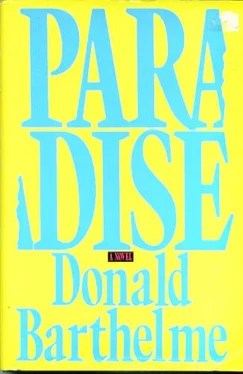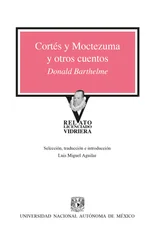Simon is amazed by what he doesn’t care about. He’s bought nothing but a couple of new shirts and a few books. He’s thought of no new projects. He reads Progressive Architecture and critiques what he sees there in a mood of amiable colleagueship. He’d done a building in 1981 that had pleased him, a Catholic church in a not-good area near Temple University, where the liquor stores gave you your bottle by request over a formidable counter, no browsing in the stacks. The parish was so poor that he’d cut his fee to almost nothing; the other partners were not happy about it but had accommodated him. The church was a bare-bones steel building with insets of glass block as its only design flourish, these however stacked eighteen feet high in twelve bays on either side of the sanctuary — the glass block was the light-giving element, and resisted thievery, too. It had been popular in the 30s, considered a design cliche in the 40s, 50s, 60s and 70s, and presented itself again in the 80s, fresh as new dung. Something to be said for being fifty-three, you could enjoy the turning of the wheel. He feels every additional day a great boon. He doesn’t understand people who have futures, palpable futures. He takes an interest in the obituary pages of the newspapers, the summations, tidy packages, So-and-so gets three inches whereas Tra-la-la got seven. He has a pain where his liver is presumed to be and is vomiting rather too much. He’s paid $35,107 in Federal taxes for last year and has before him a request from the IRS for an additional $41.09. These people are wonderful, he thinks, they want the last forty-one bucks and nine cents. You’d think with the thirty-five thou they’d say let’s have a beer and forget about it.
Dore is brusque upon awakening, Anne cheerful as a zinnia. Veronica frequently comes to the breakfast table (hardly a table, a slab of butcher block on top of some cabinets with four stools around it) pale with despair, then is overtaken with great gusts of enthusiasm, for Lohengrin or oyster mushrooms or Pierre Trudeau. They’re so lovely that his head whips around when one of them enters the room, exactly in the way one notices a strange woman in a crowd and can’t avoid, can’t physically avoid, loud and outrageous staring. My senses are being systematically dérégled, he thinks, forgive me, Rimbaud. Dore is relatively tall, Anne not so tall (but they are all tall), Veronica again the middle term. Breasts waver and dip and sway from side to side under t-shirts with messages so much of the moment that Simon doesn’t understand a tenth of them: ALLY SHEEDY LIVES! Who is Ally Sheedy? In what sense does she live, and why is the fact worthy of comment? They know, he doesn’t. Simon has actually met Pierre Trudeau (at a three-day city-planning conference in Ottawa) and found him a charming and thoughtful man. This earns him about a crayon’s worth of credit with his guests.
He attempts generalizations. Dore is crusty, Veronica is volatile, Anne is a worrier. The generalizations are banal but comforting, like others he’s been faithful to over many years, architecture is frozen music and art is a source of life.
In the middle of the night he senses someone standing over his bed.
“Who’s that?”
“It’s me. Dore.”
He switches on the bedside lamp.
“What’s up?”
“Do you have any money?”
“You mean cash? In the house?”
“I need a couple of hundred.”
“Right now?”
She’s wearing a white lace peignoir with long filigree sleeves.
“Right now. Two hundred, if you have it.”
“Let me look.”
Simon gets out of bed and opens a book, On Adam’s House in Paradise. He takes out a stack of bills and counts out two hundred in twenties.
“It’s my bad brother,” Dore says. “He’s downstairs. He always arrives without warning. One of his endearing traits. Thanks. I’ll pay you back.”
She gives him a quick kiss and starts to leave, then pauses.
“What’s your wife’s name, Simon?”
“What’s my wife’s name?”
“You don’t have to tell me.”
“Carol.”
“Pretty name.”
They say, repeatedly:
“See what I’m saying?”
“See what I’m saying?”
“See what I’m saying?”
A: In the dream, my father was playing the piano, a Beethoven something, in a large concert hall which was filled with people. I was in the audience and I was reading a book. I suddenly realized that this was the wrong thing to do when my father was performing, so I sat up and paid attention. He was playing very well, I thought. Suddenly the conductor stopped the performance and began to sing a passage for my father, a passage that my father had evidently botched. My father listened attentively, smiling at the conductor.
Q: Does your father play? In actuality?
A: Not a note.
Q: Did the conductor resemble anyone you know?
A: No.
Q: What did you do, after work, in the evenings or on weekends, in Philadelphia?
A: Just ordinary things.
Q: No special interests?
A: I was very interested in bow-hunting. These new bows they have now, what they call a compound bow — Also, I’m a member of the Galapagos Society, we work for the environment, it’s really a very effective —
Q: And what else?
A: Well, adultery. I would say that’s how I spent most of my free time. In adultery.
Q: You mean regular adultery.
A: Yes. Sleeping with people although legally bound to someone else.
Q: These were women.
A: Invariably.
Q: And so that’s what you did, in the evenings or on weekends…
A: I had this strange experience. Today is Saturday, right? I called up this haircutter I go to, her name is Ruth, and asked her for an appointment. I needed a haircut. So she said she had openings at ten, ten-thirty, eleven, eleven-thirty, twelve, twelve-thirty — on a Saturday. Do you think the world knows something I don’t know?
Q: It’s possible.
A: What if she stabs me in the ear with the scissors?
Q: Unlikely, I would think.
A: Stabs me in the ear with the scissors in an excess of rage?
Q: Your guilt. I recognize it. Clearly, guilt.
A: Nonsense. The prudent man guards his eardrums. The prudent man avoids anomalous circumstances.
Q: You regard yourself as prudent.
A: I regard myself as asleep. I go along, things happen to me, there are disturbances, one copes, thinking of the golden pillow, I don’t mean literally golden but golden in my esteem —
Q: Let me play this track here for you, it’s by Echo and the Bunnymen —
A: I’ll pass.
Q: I also have a video of the Tet offensive with Walter Cronkite…
“He’s not potent more than forty-two percent of the time.”
“Maybe we could feed him nourishing broths.”
“They say that vitamin E is good for that.”
“That’s what I hear too.”
“What if we give him too much vitamin E and it poisons him?”
“I don’t think you can give somebody too much of any particular vitamin. The body takes what it needs and rejects the rest I read about it.”
“It’s because he’s so old.”
“I don’t think so I read about this guy who was ninety-three and still was fathering children when he was ninety-three.”
“Perhaps at long intervals after he had been carefully fed with vitamin E and nourishing broths.”
“Maybe we should offer stimulating photographs.”
“Of what?”
“Potentially arousing scenes.”
“You mean the photographs would be more arousing than we are?”
“Well I don’t know how their minds work.”
“Maybe we should offer him potentially arousing scenes that are not photographs.”
Читать дальше












